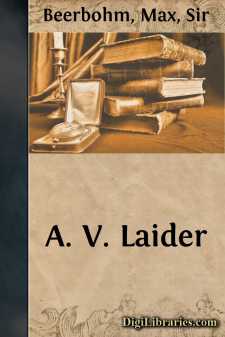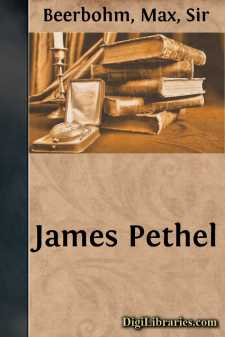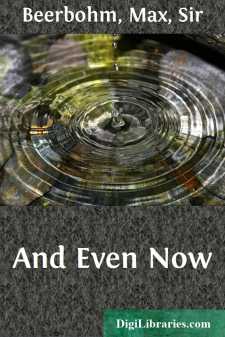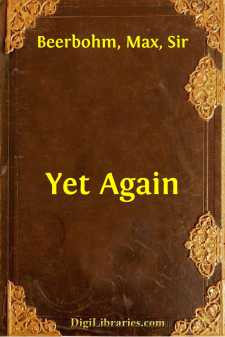Categories
- Antiques & Collectibles 13
- Architecture 36
- Art 48
- Bibles 22
- Biography & Autobiography 813
- Body, Mind & Spirit 142
- Business & Economics 28
- Children's Books 12
- Children's Fiction 9
- Computers 4
- Cooking 94
- Crafts & Hobbies 4
- Drama 346
- Education 46
- Family & Relationships 57
- Fiction 11828
- Games 19
- Gardening 17
- Health & Fitness 34
- History 1377
- House & Home 1
- Humor 147
- Juvenile Fiction 1873
- Juvenile Nonfiction 202
- Language Arts & Disciplines 88
- Law 16
- Literary Collections 686
- Literary Criticism 179
- Mathematics 13
- Medical 41
- Music 40
- Nature 179
- Non-Classifiable 1768
- Performing Arts 7
- Periodicals 1453
- Philosophy 64
- Photography 2
- Poetry 896
- Political Science 203
- Psychology 42
- Reference 154
- Religion 513
- Science 126
- Self-Help 84
- Social Science 81
- Sports & Recreation 34
- Study Aids 3
- Technology & Engineering 59
- Transportation 23
- Travel 463
- True Crime 29
The Works of Max Beerbohm
by: Max Beerbohm
Categories:
Description:
Excerpt
Dandies and Dandies
How very delightful Grego's drawings are! For all their mad perspective and crude colour, they have indeed the sentiment of style, and they reveal, with surer delicacy than does any other record, the spirit of Mr. Brummell's day. Grego guides me, as Virgil Dante, through all the mysteries of that other world. He shows me those stiff-necked, over-hatted, wasp-waisted gentlemen, drinking Burgundy in the Café des Milles Colonnes or riding through the village of Newmarket upon their fat cobs or gambling at Crockford's. Grego's Green Room of the Opera House always delights me. The formal way in which Mdlle. Mercandotti is standing upon one leg for the pleasure of Lord Fife and Mr. Ball Hughes; the grave regard directed by Lord Petersham towards that pretty little maid-a-mischief who is risking her rouge beneath the chandelier; the unbridled decorum of Mdlle. Hullin and the decorous debauchery of Prince Esterhazy in the distance, make altogether a quite enchanting picture. But, of the whole series, the most illuminative picture is certainly the Ball at Almack's. In the foreground stand two little figures, beneath whom, on the nether margin, are inscribed those splendid words, Beau Brummell in Deep Conversation with the Duchess of Rutland. The Duchess is a girl in pink, with a great wedge-comb erect among her ringlets, the Beau très dégagé, his head averse, his chin most supercilious upon his stock, one foot advanced, the gloved fingers of one hand caught lightly in his waistcoat; in fact, the very deuce of a pose.
In this, as in all known images of the Beau, we are struck by the utter simplicity of his attire. The 'countless rings' affected by D'Orsay, the many little golden chains, 'every one of them slighter than a cobweb,' that Disraeli loved to insinuate from one pocket to another of his vest, would have seemed vulgar to Mr. Brummell. For is it not to his fine scorn of accessories that we may trace that first aim of modern dandyism, the production of the supreme effect through means the least extravagant? In certain congruities of dark cloth, in the rigid perfection of his linen, in the symmetry of his glove with his hand, lay the secret of Mr. Brummell's miracles. He was ever most economical, most scrupulous of means. Treatment was everything with him. Even foolish Grace and foolish Philip Wharton, in their book about the beaux and wits of this period, speak of his dressing-room as 'a studio in which he daily composed that elaborate portrait of himself which was to be exhibited for a few hours in the clubrooms of the town.' Mr. Brummell was, indeed, in the utmost sense of the word, an artist. No poet nor cook nor sculptor, ever bore that title more worthily than he.
And really, outside his art, Mr. Brummell had a personality of almost Balzacian insignificance. There have been dandies, like D'Orsay, who were nearly painters; painters, like Mr. Whistler, who wished to be dandies; dandies, like Disraeli, who afterwards followed some less arduous calling....









